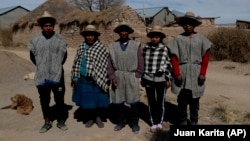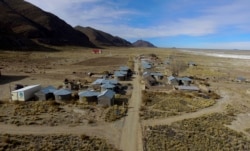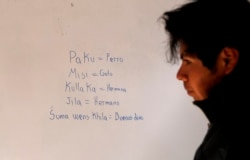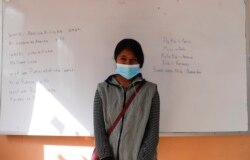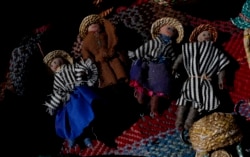For many generations, the homeland of the Uru people was not land at all: It was the salty waters of Lake Poopo.
The Uru -"people of the water" - would build a sort of family island using plants when they married. They would live on what they could take from the wide, shallow lake in the highlands of southwestern Bolivia.
"They collected eggs, fished, hunted flamingos and birds. When they fell in love, the couple built their own raft," said Abdón Choque, leader of Punaca, a town of about 180 people.
Now what was Bolivia's second-largest lake is gone. It dried up about five years ago, the result of shrinking mountain glaciers and water use for farming and mining operations.
During rainy season, small bodies of water reappear in areas of the former lake.
Now, the Uru of Lake Poopo live near the lake’s salt-crusted former shoreline in three small settlements. Around 600 people are looking for ways to make a living and trying to save even their culture.
Luis Valero is leader of the Uru communities around the lake. He said, "Our grandfathers thought the lake would last all their lives, and now my people are near extinction because our source of life has been lost."
Not long before the lake was lost, the Uru-Cholo language died. Younger generations learned Spanish in school. At work, they use other, more common Indigenous languages, Aymara and Quechua.
To save their identities, the communities are trying to revive their language - or at least its closest related language. Aided by the government and a local foundation, they have invited teachers from a related group of the Uru, the Uru-Chipaya near the Chilean border to the west, to teach that language to their children. It is one of 36 officially recognized Bolivian languages.
"In these times, everything changes. But we are making efforts to maintain our culture," Valero said. "Our children have to recover the language to distinguish us from our neighbors."
Avelina Choque is a 21-year-old student who would like to teach mathematics someday. She said the Uru-Chipaya teachers use numbers, songs and common expressions to teach the language.
"It's a little difficult to pronounce," she added.
The pandemic has made learning the language even more difficult. The teachers have been unable to hold in-person classes during the pandemic, leaving students to learn from texts, videos and radio programs.
Punaca Mayor Rufino Choque said the Uru began settling on the lakeshore in the past 30 years as the lake began to get smaller. However, there were already people living on most of the lands around the lake.
"We are ancient, but we have no territory. Now we have no source of work, nothing," said the 61-year-old mayor. The round homes of Punaca are lined up along a dirt road.
With no land for farming, the young men work as laborers, herders or miners in nearby towns or more distant cities. "They see the money and they don't return," says Abdón. Some of the women make handicrafts of straw.
The broader Uru people once controlled a large part of the area. There are still branches around Peru and Lake Titicaca to the north, around the Chilean border and near the Argentine border.
I’m Jill Robbins.
Carlos Valdez wrote this story for the Associated Press. Jill Robbins adapted it for Learning English. Caty Weaver was the editor.
__________________________________________________________________
Words in This Story
shallow – adj. having a small distance to the bottom from the surface or highest point
extinction – n. the state or situation that results when something (such as a plant or animal species) dies our completely
distinguish – v. to notice or recognize a difference between people or things
herd – v. to gather and move a group of animals
What do you think of the situation in Bolivia? How is it similar to or different from the changes happening where you live? We want to hear from you. Write to us in the Comments Section.



